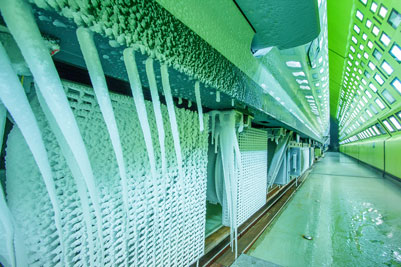Class 700 tackles extreme weather head on
Posted: 1 May 2014 | | No comments yet
The first Class 700 Desiro City vehicles, built by Siemens for the Thameslink routes, have been put through their paces in a special climate chamber to ensure the vehicles can endure extreme weather conditions…


The first Class 700 Desiro City vehicles, built by Siemens for the Thameslink routes, have been put through their paces in a special climate chamber to ensure the vehicles can endure extreme weather conditions.
Technical experts from Siemens, First Capital Connect (as the train operator) and Eversholt Rail Group (representing Cross London Trains, the owner of the vehicles) have recently performed and witnessed the climatic testing of three vehicles in the Rail Tec Arsenal climate chamber in Vienna, Austria.


The temperature range available allowed Siemens to incorporate extreme high ambient temperatures of up to 40 degrees Celsius, and low temperatures down to -25 degrees Celsius
Tests focused on the Class 700’s ability to withstand the effects of extreme ambient temperatures, solar gain, ice, snow and wind. The complex series of tests examined interior components, like air conditioning and heating, and exterior mounted components, which included:
- Simulating coupling scenarios (front coupler), traction/brake functionality and exterior CCTV camera performance in extreme conditions;
- Ensuring doors can open and close in severe snow and ice;
- Testing that wind screen heaters work when the cab windscreen is iced up;
- Ensuring the correct performance of the windscreen wipers at speeds of up to 100mph.
The Rail Tec Arsenal climate chamber in Vienna is unique in the extreme climatic conditions it can simulate, including solar gain, relative humidity, snow and ice conditions and very high wind speeds in the “large” Climatic Wind Tunnel (CWT).
The temperature range available allowed Siemens to incorporate extreme high ambient temperatures of up to 40 degrees Celsius, and low temperatures down to -25 degrees Celsius, into the extensive test plan for Class 700 vehicles.
The extreme weather testing programme marks an important milestone for the new Thameslink fleet. Manufacture of the 1,140 carriages is well underway and on schedule. Currently over 45 body shells have been completed and the first full 12 car train has been delivered to Siemens’ test track in Wildenrath, Germany, to begin an intensive testing programme.
Iain Smith, Programme Director, Thameslink, at Siemens Rail Systems UK, said: “Siemens’ trains are synonymous with reliability and quality and the Class 700 is no exception.
“There’s nothing worse for rail passengers than having to deal with a late or cancelled service because of faulty doors, or sitting in discomfort during hot weather, so we’ve really put the new trains through their paces in the climate chamber.”
He continued: “Extreme weather conditions are just part of an intensive test process for the Class 700. Each of the 1,140 carriages will also undergo rigorous testing and fault free mileage accumulation at Wildenrath to ensure the trains are as close to working ‘out of the box’ as possible and ready for passenger service on the important Thameslink routes.”
Jonathan Bridgewood, First Capital Connect Thameslink Programme director, said: “Train reliability during very cold winter months can be a real issue for our passengers so we’re delighted to have witnessed the testing of the future Thameslink train to such extremes of temperature.
“These rigorous tests not only build our confidence in the reliability of the train but they also show that passengers will always be able to travel in comfort whether it is bitterly cold outside or a real summer scorcher.”
Andy Pitt, Executive Chairman of Cross London Trains added: “As the future, long-term owner of the trains, we really see reliability of the new vehicles as a key requirement. It’s therefore essential to us that extensive testing is carried out well in advance of the trains carrying fare-paying passengers.”
The Class 700 trains are approximately 25% lighter than previous generations, and are up to 50% more energy efficient. They have been designed to be spacious and airy with the latest passenger information systems and features for people with restricted mobility.
The Government-sponsored Thameslink Programme (rolling stock and infrastructure works) will create 8,000 jobs and transform north-south travel through London. The first Class 700 will be introduced on the Bedford to Brighton line in early 2016. By the end of 2018, the Class 700s will run with high frequency through central London every two-three minutes at the busiest times. This equates to 24 trains per hour in each direction through the central core.


